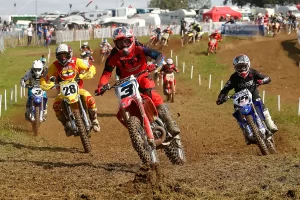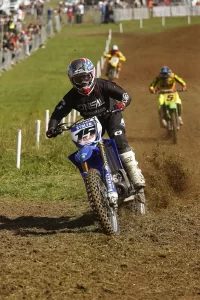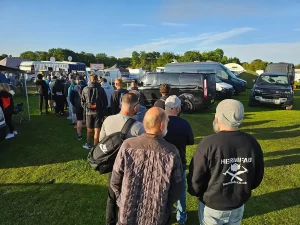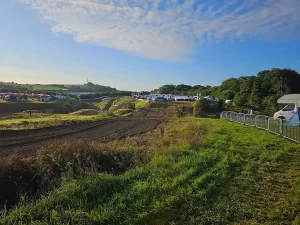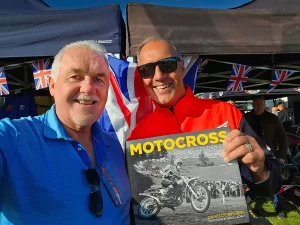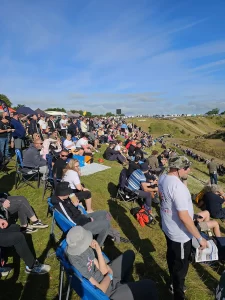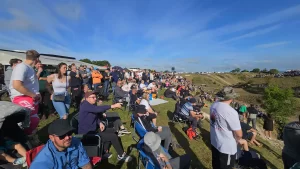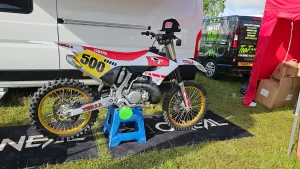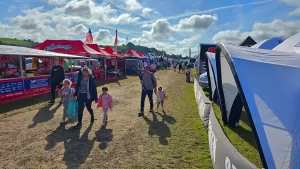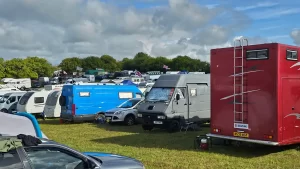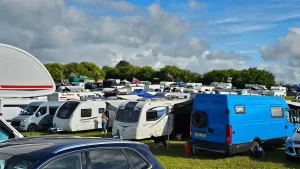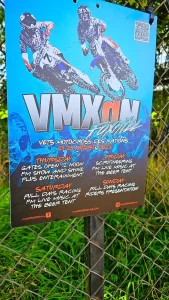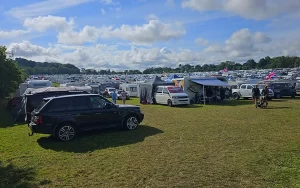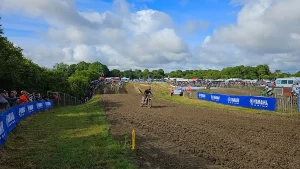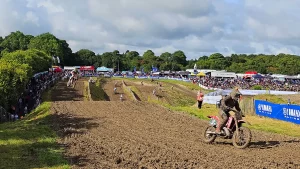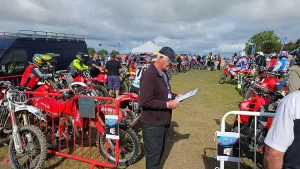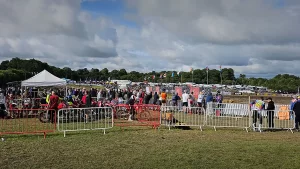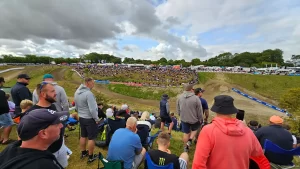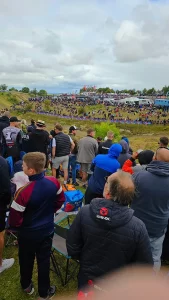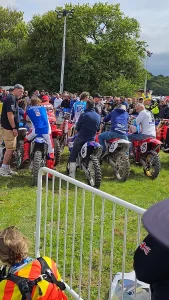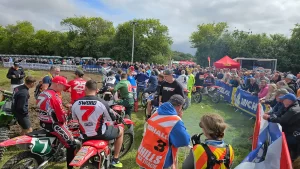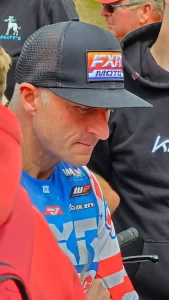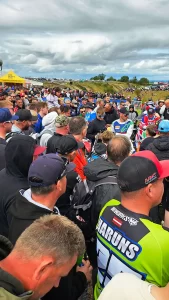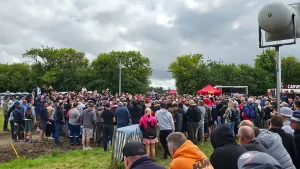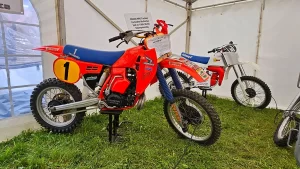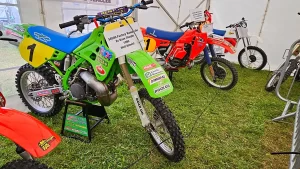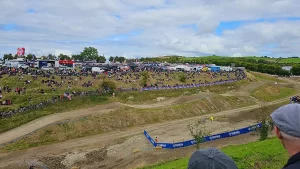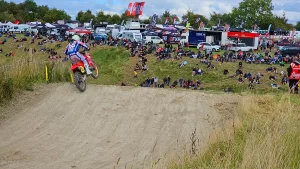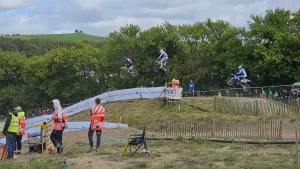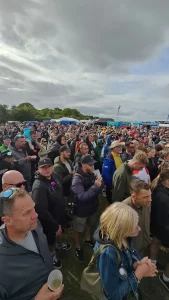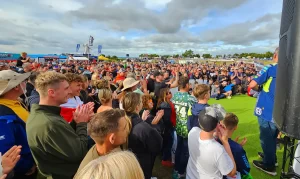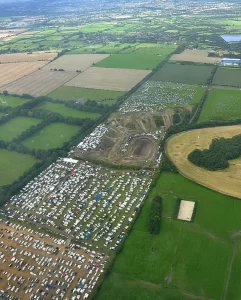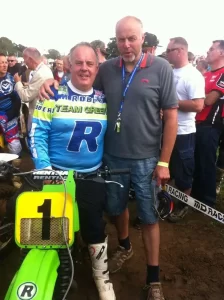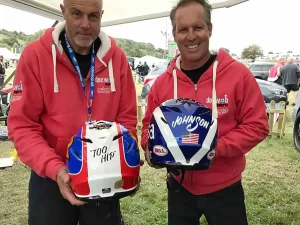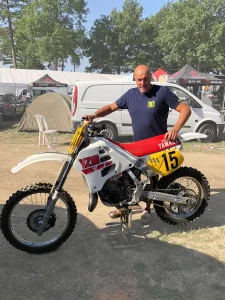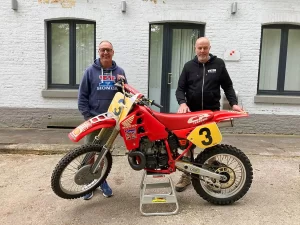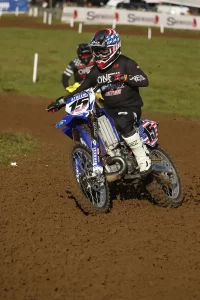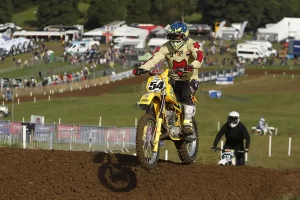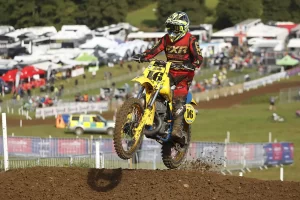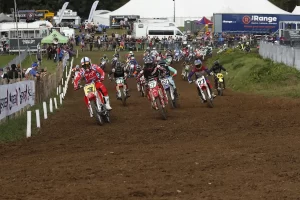The King of Vintage Racing
David Dewhurst
Dave King is the undisputed ruler of vintage motocross racing. Like all the kings before him, Dave’s rise to supreme leadership was not easy. He admits to having to fight some major battles on his way to moto dominance, but unlike battles of old, this King settled his disputes diplomatically, with nary a drop of spilled blood.
Dave’s ascension from middle-class bricklayer to ruler of the two biggest vintage motocross events in the world is hard to fathom. The Vet Motocross des Nations and the Farleigh Castle Vets MX have taken on global stature and the king himself sometimes seems a little amused about his rise to off-road dominance. “I was just an average amateur rider, “admits Dave from his home in the south of England. “I was just a hobby rider. I didn’t really have the money or the ability to go far,” he chuckles. “My parents didn’t have much money. I was twenty before I could buy my first bike.”
Dave was quite happy riding local amateur races until he visited a vintage race at Farleigh Caste in 1996. “That’s where my love of the old stuff came from,” he says of the first vintage race he ever attended. “That sparked my interest, and I went out and bought a 1977 390 Husky.” He started riding some of his favorite old tracks in England, “…but I quickly fell in love with riding abroad in Holland, France, and Germany, and it was just like a dream come true to be able to go abroad and race.” The admitted middle-of-the-pack bloke loved the camaraderie of those vintage races, but he admits to quickly developing a more expensive passion.
“I’d go to the Grands Prix, and while the racing was going on, I’d be the guy leaning over the paddock fence staring at all the GP machinery.” That’s what happened in 2006 when Dave bumped into British champion and Kawasaki factory rider Kurt Nicoll at the Spanish GP. “I flippantly asked Kurt if he had any bikes left and he just said, ‘Yeah, I’ve got two factory Kawasakis at home that I want to sell.’ This was on a Sunday, and I said, ‘I’ll be there tomorrow afternoon.’ So, I flew back to the UK, drove up to his dad’s workshop and bought his 1988 SR 500.”
The bricklayer from Wimborne had just crossed the Rubicon, and his life would never be the same again. His passion for motocross was rapidly turning into an addiction, and factory bikes were to become his drug of choice. “Back then, factory bikes didn’t fetch what they do today,” admits King. “But I wanted to buy Dave Thorpe’s 1989 championship-winning Honda, and I had no money. So, I had to sell the SR500 Kawasaki to pay for it.” The Honda had been a gift to Thorpe from the factory for winning three 500cc World Championships, but it came with no internal pieces. “The cases were empty, and there was nothing in the suspension.” That’swhere Dave’s years of racing in Europe came into play. “I had lots of friends on the continent, and I went on a mission to find the parts I needed.”
In the end it was factory racer Georges Jobe who helped Dave find most of the parts he needed to make the factory Honda whole again. “My aim was just to get the bike back out in the world and racing again,” admits Dave. But that was to be only the beginning. In 2009, Dave and a group of friends decided to promote their own vintage race at the famed Farleigh Castle Grand Prix track. “Other promoters had run events there, but they were missing all the details,” says King. “They brought over riders like Brad Lackey but never had him ride around on his factory Suzuki. People wanted to see that.”
That’s where King’s precious factory Honda came in. “We had Dave Thorpe riding his championship bike at our first race, which was a huge draw.” Dave admits that the event was ‘shambolic’. “I’d never organized anything like that before, and neither had my friends.” Despite their inexperience, King and his friends managed to put on a hugely successful event that would become a model for the much bigger races to come.
The next few years saw the Farleigh Castle event grow in size and stature. It quickly became the biggest event on the vintage world calendar. But behind the scenes there was growing friction between Dave and his fellow organizers. Eventually, they parted company and Dave started work on an alternate plan, along with aftermarket moto legend and bike restorer Doc Wob.
Dave admits, “You have to move with the times, and with older riders dropping out, the interest in older vintage bikes was going away.” The new plan was to include post-vintage bikes on a more modern track, and the Foxhill GP track was the prefect venue. The newer single-shock classes were a perfect match for the steep hills and huge jumps of Foxhill and Dave and Doc knew that they needed a matching lineup of racers to finish the perfect package. Doc Wob had worked as a team mechanic in the US and had plenty of contacts with big-name riders. King was also working hard to find riders both in America and Europe and it didn’t take long to persuade a huge list of motocross greats to fly to England. “It wasn’t easy because these guys don’t come for free,” admits King. “We had to figure out a deal to get them here, put them up and also give them a fast and reliable bike.”
King’s partner Doc Wob is the one responsible for building top-class machinery for the foreign stars. “We haven’t had a single DNF so far,” says King with a smile. “It’s a year-long process to get all those bikes built. But it’s definitely worth the effort to see top racers on top machines. The spectators want to see these top guys on good bikes.”
When asked to say who the most popular rider is, it doesn’t take King long to answer. “I’m sure it’s Dave Thorpe. He’s a local lad.” It also helped that Thorpe was reunited with the factory HRC Honda that Dave King had lovingly restored in his garage. “Having the stars there is, I think, key to the success of the event. Others might disagree, but top riders are the secret.”
The staggering success of King’s events suggests he really has found the secret. In only its second year, the Foxhill Vet Motocross des Nations event had over 15,000 spectators and 1,000 riders. That is twice as many spectators as this year’s modern Motocross des Nations at Matterley Basin, just a few miles south of Foxhill. The vet event’s seventy-acre site near Swindon in the south of England was so packed with spectators it was sometimes tough to see the racing. King says that the toughest part of the event was trying to get all the spectator cars into the parking areas. “We had a line of cars all the way back to the motorway,” admits King with a smile. “We had talked about expanding the space, but we’re not going to do that. We just need to get people in more efficiently.”
Fifteen thousand spectators might be hard to imagine at a vintage motocross race, but the list of celebrity riders who’ve attended King’s events over the years might help explain the vast numbers. In no particular order they are: Dave Thorpe, Andre Malherbe Georges Jobé, Rick Johnson, Johnny O’Mara, Kurt Nicoll, Rob Herring, Graham Noyce, Jeff Ward, Ron Lechien, Jeff Stanton, Jean Michele Bayle, Guy Cooper, Doug Dubach, Ryan Hughes, Neil Hudson, David Philippaerts, Alessio Chiodi, Mike Browne, Chuck Sun, Andrew Short, Sam Sunderland, Clement Desalle, Jacky Vimond, Doug Henry, Frederick Bolley, Eves Demaria, Mike Bell, Trampas Parker, Jeremy Whatley, Jeff Emig, James Dobb, Werner DeWitt, Leif Persson, and John Dowd.
So, who’s lined up for the 2025 event? King admits its early days yet, but he confirmed that Moto2 champion Christophe Pourcel has been signed, and others are in the works. What’s almost certain is that perennial favorites Mike Brown and Doug Dubach will also make their annual trip to England. Like this year, that duo will also be at the Farleigh event as well.
“We bought back the rights to the Farleigh event this year, and we are working to build that race back up again,” says King. “Farleigh is a different demographic,” explains King. “It is aimed at older bikes, and the spectators are also older. Foxhill attracts the 30- to 50-year-olds, while Farleigh brings in the 50-plus enthusiasts. The track has a lot of history from the Grands Prix. It’s a more traditional grass event with very few jumps.“
In their first year back at the historic venue, King and Doc Wob attracted a very strong field of racers, but the spectator count was only around one thousand. “It’s never going to be as big as FoxHill,” admits King. “A lot of the spectators are getting old. They are aging out. That’s why we are always looking at ways to change our events to best suit the spectators. It’s a lot of work.”
With the possible addition of a third even in the near future, King admits that motocross promotion really has become a very full-time job. “At one point I had as many as fifty vintage bikes behind my house. It really was an obsession. I probably raced until 2015, and I rode my HL500 Yamaha a lot.” In recent years, the bike collection has dwindled to just fifteen, and only two factory bikes remain: a Michelle Pichon RH250 Suzuki and a 1996 RC250 Honda. “I’m probably the only person on the planet to have owned factory bikes and never ridden them. I just never saw the need to, you know. I wouldn’t know the difference between a good engine and a bad one. It’s pointless, and the parts on those things are so fragile after all these years that it’s not worth it. I just never thought I was worthy of riding them.” King’s voice drifts off as he thinks about the missed opportunity of a lifetime.
Dave King might not feel worthy of riding a classic factory bike, but he has definitely proven to be worthy of organizing vintage races where those famous bikes and their equally famous riders come together one last time. “The Vet Motocross des Nations is bigger than the next three European vintage race events combined,” announces King with obvious pride. “It’s all about moving with the times and giving people what they want.” Clearly, King knows what people want, and the 2025 events will once again prove to be one of the best races any motocross fan could ever hope to attend.
https://www.vmxdnfoxhill.com/
https://farleighcastlevetsmx.co.uk/event

